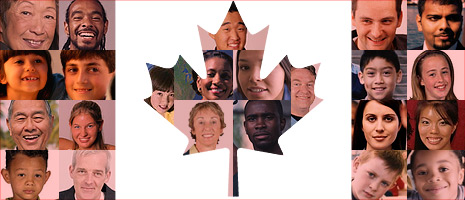Owing to my past work experience in the Canadian Consulate in Shanghai, I have had the chance to attend several talks by hyphenated-Canadian writers, including Larissa Lai (Chinese: 黎喜年), Fred Wah (Chinese: 关富烈) and Vincent Lam (Chinese: 林浩聪), at Chinese universities. Because of their Chinese appearance and names, suggesting their Chinese descent, questions about their Chinese and/or Canadian identities were commonly raised by the students in the audiences. To some extent, I suppose, the Chinese students were expecting some natural ties, cultural or linguistic, between these writers and themselves, and I had some of the same expectation as well. It seemed natural to take for granted our shared “roots”. Eventually, it came to our realization that there was nothing beyond their Chinese “look” and names to suggest that we could share more commonalities, such as language, national history and culture, as well as normative behaviors. I was amazed by this observation and wondered how this overturning “identity change” could happen?
Following my curiosity to explore the theme of the formation of Canadian identity among members of “ethnic minorities” in Canada, I took the opportunity of my volunteer experience at the Little Mountain Neighborhood House to interview four non-Caucasian Canadians there, with the expectation to obtain a better understanding of what the anthropologist Liisa Malkki argues is an “always mobile and processual identity”[1].
The interviewees are from different ethnic background, including Middle Eastern, Latin American and Asian, and they differ in language ability and length of time spent living in Canada. Among a few questions to assess the extent to which the interviewees integrate into the mainstream Canadian culture and lifestyle — a key benchmark of the development of Canadian identity from my perspective — one question was designed to test whether and, if so, the extent to which they define themselves as Canadian. The various responses from the four interviewees are representational, and reflect Malkki’s statement that “identity is … partly self-construction, partly categorization by others …”[2]
Interviewee #1:
“I love Canada. I like hockey. Canada is now my homeland. I live in Canada, my life is in Canada, my children are here. It’s a very good country. I like the people here. I like Canada for it’s a multicultural country.”[3]
Interviewee #2:
“I live here in Canada, but I am Mexican. I am not Canadian, I don’t look Canadian. My culture is Mexican. When your thoughts, your heart and your culture are Canadian, you can be Canadian. However, even if you have a citizenship, but your brain, your heart, your culture are different than the Canadians’, you can’t be Canadian. People born here, growing up here — it doesn’t matter if their parents are from other countries — they are Canadians. Maybe my daughter can be Canadian. She’s growing up here.”[4]
Interviewee #3:
“I wouldn’t say I am fully Canadian. There are some values, things that you kind of carry with you. Even though I haven’t really lived in my country of origin, but still, there’s an aspect for which I identify myself. It’s my root. I am more just a citizen of the world.”[5]
Interviewee #4:
“I am Canadian. I am part of the country. I am contributing my effort, my skills and my knowledge to the society. I am definitely Canadian! But I am originally from another country.”[6]
“The immigration process impacts the identity of ethnocultural, racial, religious and linguistic minority Canadians… Although the beginning point is well-defined, the end point may vary with each individual and group”, says Professor Evangelia Tastsoglou of Sociology from Saint Mary’s University, “However, settlement is not synonymous with adaptation, integration, civic engagement, and (social) citizenship with its concomitant identity formation; all of these are processes that may go on for life”[7]. The four interviewees with their respective immigration histories and conditions are placed in different phases of immigration process, and their linguistic and ethnocultural adaptability has an impact on the development of their Canadian identity. As sociologist Dick Hebdige once declared, “the roots themselves are in a constant flux and change. The roots don’t stay in one place. They change shape. They change color. And they grow.”[8] Similarly, the interview findings show the four respondents’ willingness to more or less integrate into mainstream Canadian society; their self-identity has also evolved and will continue to evolve in the process of their immigration, however long it takes.
[1] Malkki, Liisa. 1992. Naitonal Geographic: The Rooting of Peoples and the Territorialization of National Identity among Scholars and Refugees. Cultural Anthropology 7 (1): pp.37
[2] Ibid.
[3] The interviewee #1 was forced to immigrate to Canada eight years ago from Middle-East.
[4] The interviewee #2, originally from Latin America, had been a temporary foreign worker in Canada since 2007, and became a permanent resident in April 2012.
[5] The Interviewee #3 immigrated to Canada at age of 3 from Latin America, and received education in Canada.
[6] The Interviewee #4 immigrated to Canada seven years ago from Asia, and has years of volunteer experience at several Neighborhood Houses in Vancouver.
[7] Evangelia Tastsoglou, The Immigration Process and Minority Identities: Where We Are and What We Still Need to Know, Canadian Diversity, Vol. 1:1, Summer 2002, PP. 14-18.
[8] Cited in Liisa Malkki’s Naitonal Geographic: The Rooting of Peoples and the Territorialization of National Identity among Scholars and Refugees. 1992. Cultural Anthropology 7 (1): pp.37

